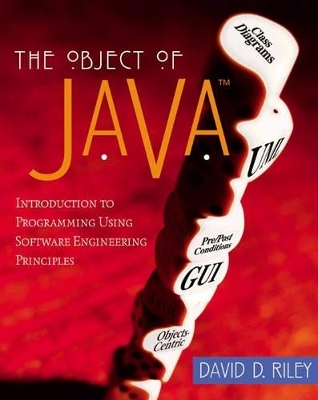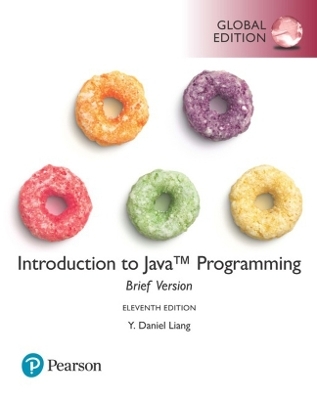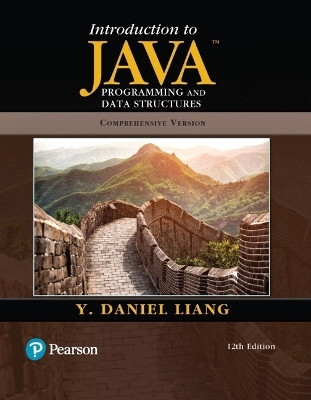
The Object of Java
Addison Wesley
978-0-201-71585-9 (ISBN)
- Titel ist leider vergriffen;
keine Neuauflage - Artikel merken
"The Object of Java" embraces the object-oriented paradigm by taking an "objects-centric" approach to presenting problem solving and programming. Readers begin with four chapters focusing on objects, classes and methods. The presentation of primitive data occurs in Chapter 5, ensuring the necessary prior exposure to object declaration, object instantiation, assignment, method calling, parameter passage, class diagrams and object diagrams. Since specifications are critical for conveying code behaviour in the object-oriented model, discussions of method preconditions and postconditions, and class invariants are used to document examples and to define example classes. The Unified Modelling Language is used as the specification language.
Objects and Classes. Objects Everywhere. Objects in Software. Anatomy of a Software Class. The Difference Between Objects and Classes. Edit, Compile and Run. Introduction to Software Engineering. A Sample of Object-oriented Software Development. The Software Inspector. Introduction to Java Objects. Syntax Diagrams. The Method Call. Instruction Sequences. Constructing and Assigning Objects. Swapping. Putting it Together in a Java Class. Programming by Contract. Comments. The Software Inspector. Introduction to Design & Implementation. Top-down Design Refining Algorithms. Selecting Identifiers. A Second Design Example. A GUI Software Library. Calling Methods with Parameters. Import Declarations. Prototyping. Debugging System.out.println. Summary. The Software Inspector. Methods. The Need for a Subprogram. Private Parameterless Methods. Using Parameters. Local Variables. Non-void Methods. this. Introduction to Event Handling. Postcondition Notation. A Design Example Using AView. The Software Inspector. Numeric Processing. Primitive Types. Primitive Integer Data Types. Differences Between Primitives and References. Real Numbers (float and double types). System.out.println Revisited. Mixed Type Numeric Expressions. Primitive Methods (including Math). Constants (final). Numeric Expression Patterns. Design Example Dynamic Histogram. The Software Inspector. Supplier Classes. Clients and Suppliers in Software. Another Client. Suppliers. Scope and Lifetime. Class Interface Design Principles. Separating Read and Write Access. Method Overloading. char Data Type. Strings. ALabel (optional). The Software Inspector. Logic and Selection. The if Instruction. Relational Expressions. Boolean Expressions. Conditional Evaluation. Predicates. Nesting if Instructions. Multi-way Selection. The switch Instruction. Software Testing. Logic and Programming (optional). Assertions Revisited (optional). The Software Inspector. Inheritance. Extends. Class Relations: contains_a and is_a. Specialization and Extension. protected Scope. Inheriting for Event Handling. Animating by Inheriting EventTimer (optional). Design Example with Scrollbars and Text Fields (optional). Summary. The Software Inspector. Inheritance Hierarchies and Polymorphism. Inheritance Hierarchies. Type Conformance. Subtype Polymorphism. Abstract Classes. The Object Class. Equality by Content and by Identity. The Software Inspector. Repetition. The while Loop. Counting Loops. Sentinel Loops. Loop Design Cautions. Nested Loops. The do loop. Loop Invariants. Looping and Event Handling. Testing and Loops. The Software Inspector. Containers. Containers of Objects. Generic Containers. Type Safety, Casting, and instanceOf. Wrapper Classes. Lists. List Traversal. Linear Searching. Sorting by Insertion. The Software Inspector. Introduction to Arrays. One-dimensional Arrays. Keeping Indices in Bounds. Sequential Processing with for Loops. Treating Arrays in Aggregate. Tables. Arrays of Objects. Arrays and Objects. Sorting - the Selection Sort. Two-dimensional Arrays. The Software Inspector. File Input and Output. Files. The Java File Class. I/O Exceptions. Input and Output. DataInputStream and DataOutputStream. Text Files. Terminal-style I/O. Persistent Objects (optional). JFileChooser (optional). The Software Inspector. Recursion. Recursive Definition. From Recursive Definition to Method. Recursive Methods. Recursive Execution. Recursion and Repetition. More Complicated Forms of Recursion. The Software Inspector. Library Issues: Packages, Statics, Applets & Delegation. Creating Packages. Using Packages. static Methods. static Variables. Applications and Applets. Event Delegation (optional). The Software Inspector. APPENDIXES.
| Erscheint lt. Verlag | 27.6.2001 |
|---|---|
| Verlagsort | Harlow |
| Sprache | englisch |
| Gewicht | 1043 g |
| Themenwelt | Informatik ► Programmiersprachen / -werkzeuge ► Java |
| Mathematik / Informatik ► Informatik ► Software Entwicklung | |
| Mathematik / Informatik ► Informatik ► Web / Internet | |
| ISBN-10 | 0-201-71585-6 / 0201715856 |
| ISBN-13 | 978-0-201-71585-9 / 9780201715859 |
| Zustand | Neuware |
| Informationen gemäß Produktsicherheitsverordnung (GPSR) | |
| Haben Sie eine Frage zum Produkt? |
aus dem Bereich

